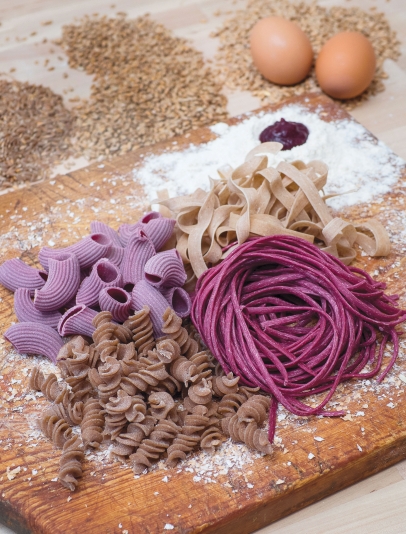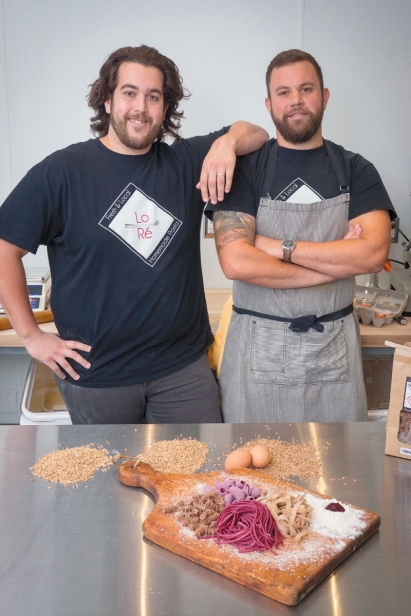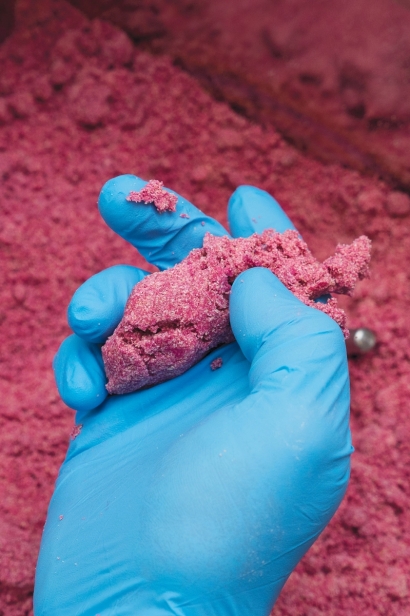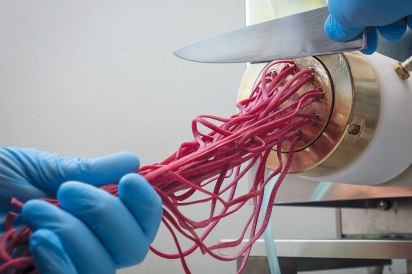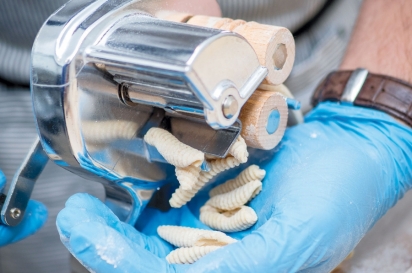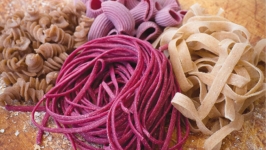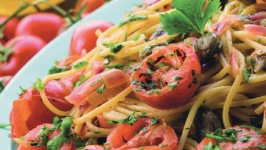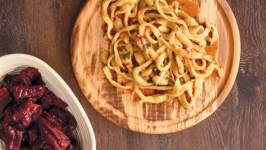At LoRé Pasta Two Brothers Bring American Noodles to New Jersey
PASTA MAKES PERFECT
For as long as the Zeck brothers can remember, holiday meals have taken place at the New Brunswick home of their Sicilian-born grandmother, Emily Saienni. This year, for the first time, those festive family meals will undoubtedly include fresh pastas from the brothers’ own nascent enterprise, LoRé Pasta.
Mario, 30, and Richard, 27, who grew up in South Brunswick, have devoted themselves to making fresh pastas—plain and flavored, extruded and hand-formed—using local ingredients. The flours come from Hunterdon and Bucks Counties, the eggs from Hillsborough, and fresh, in-season herbs and vegetables from the farmers at the West Windsor and Montgomery farmers’ markets, where LoRé Pasta also has tables each Saturday during the season. Spring offerings among their flavored pastas included, for example, bright green rotini made using Terhune Orchards spinach and a carrot pasta so colorful the brothers dubbed it “24-carrot gold.” Summer saw a beet and basil combo made with hard wheat flour from Castle Valley Mill of Doylestown, Pennsylvania. Fall featured pumpkin and butternut squash from favorite farms like Jeff ’s Organics and Von Thun’s, along with nutmeg cavatelli.
The business launched this past spring from a small, light-filled, newly renovated facility in Monmouth Junction, all pristine white and stainless-steel surfaces. But the enterprise has been more than two years in the making. “The idea started after I got out of culinary school,” says Mario Zeck, who attended Le Cordon Bleu in Las Vegas and is LoRé’s chief pasta maker. “Toward the end [of school] I started working for an Italian chef who had a small pasta shop and was the only guy in the area making all his own pastas fresh every day. That’s where I got really passionate.”
Both Zeck brothers say they owe their devotion to food and their drive to “push the envelope of what fresh pasta really is” to their grandmother Emily, for whom the business is named. Her maiden name is LoRé (pronounced Low-Ray, as is the business). Her husband—the brothers’ grandfather—owns the property the LoRé kitchen stands on, which is also home to a construction company.
Richard Zeck is the self-proclaimed “sales guy.” Both men grew up working alongside their mother at Ski Barn in Lawrenceville. (Managing the shop is still their “day job.”) It was when Mario was getting ready to move back home from Vegas that Richard and his father—also named Richard—began to hatch a plot for the brothers to go into pasta making. “When Mario was out in Vegas he got to know the business side of selling just pasta,” Richard says. “So my father and I did some research.” They discovered that the premier supplier of commercial pasta machines, Arcobaleno, is located in Lancaster, Pennsylvania. “My dad came up with an idea for us to fetch Mario and do a cross-country road trip, during which we’d hatch ideas for starting a business together.” That was three years ago.
On the way back, they picked up the pasta-extruding machine that now reigns in the LoRé kitchen. It uses bronze dies—the traditional method for attaining the optimal pasta texture for sauce to cling to. “From the beginning we knew we wanted to work with local ingredients,” says Richard, who undertook the search, starting with the all-important grains. They started by contacting the managers of local farmers’ markets to ask if anyone nearby was growing grains that could be made into pasta. They hit pay dirt with Chris Cirkus, manager of the West Windsor Farmers’ Market. Cirkus told them about two highly regarded area granaries: Castle Valley Mill, whose stone-ground spelt is the linchpin of LoRé’s fresh ricotta cavatelli, and Oak Grove Plantation & Mill in Pittstown, Hunterdon County. The latter is the source for a variety of extruded whole-wheat pastas. The flours, which are sifted at LoRé, are refrigerated to maintain maximum freshness.
As to her role in getting LoRé Pasta off to the right start, Chris Cirkus says, “I simply encouraged them to do their due diligence and not become the type of farmers’ market vendor that many markets allow, without any homage to agriculture. I gave Mario and Richard the tools and they ran with it!” She also was impressed that Mario is a trained chef. His experience includes working at the two-Michelin-star Picasso restaurant at the Bellagio in Las Vegas, under chef Julian Serrano, and in Washington, DC, at Equinox, another award-winning restaurant. “I still love DC, but I want to stay in the Garden State,” Mario says. “I want to represent! You get some good quality ingredients here.”
The brothers pick up their ingredients themselves, which gives them a chance to interact with their farmers. These include ricotta from Flemington’s Fulper Farms and eggs from Polnasek Poultry Farm in Hillsborough, which are used in LoRé’s handformed pastas, such as the cavatelli. “The Fulper ricotta impastata is exactly what I need for my ricotta spelt cavatelli,” Mario says.
That traditional ricotta—higher in fat, ultra-smooth, and low in moisture—is one reason the cavatelli sells out each week, its $10-per-pound price tag notwithstanding. Poultry farmer Tim Polnasek says he’s excited that a local pasta maker is using his eggs. He was also impressed with the brothers’ efforts in the inspection process to get his eggs approved for use.
From the start LoRé pastas sold out early in the day at both the West Windsor and Montgomery markets, which are held on Saturday. Within weeks Mario had to up his production from 60 pounds to 100-plus per week—and that’s not including the super-popular handmade cavatelli. A loyal contingent of LoRé regular customers soon formed, many of whom, Mario says, “returned every week even when it was 100-plus degrees out.” Among those is Maryann Whitman who patronizes the Montgomery market and, the Zecks say, has a lifetime weekly order of two pounds of hard wheat linguine.
Another customer, Bill Reynolds, buys pasta every week and sends the brothers emails with suggestions for restaurants that should feature their pasta. LoRé Pasta received its wholesale license from the state in the late summer, and among the first to add it to his menu was Evan Blomgren, chef-owner of the Rocky Hill Inn. “On their vegetarian menu is our beet rigatoni, which they pair with diced roasted beets, pumpkin seeds and ricotta cheese,” Mario reports. LoRé pastas are mixed in batches of about 10 pounds, using a commercial mixer that can handle up to 25 pounds. The kitchen is kept cool. “We pour the flour in and mix it slowly with very cold filtered water until it’s the right texture,” explains Mario. “Usually, that’s about 30 percent water, but it depends on the humidity. A lot of things affect it. The moisture content of the flours can vary between batches, too. It’s all trial and error.”
The extruded pastas, which include linguine, spaghetti, rigatoni, tagliatelle and fusilli, contain nothing more than flour and water. But hand-formed pastas, such as cavatelli and ravioli, can include not only cheese but also salt and olive oil. Even those ingredients are carefully chosen. The salt is from Jacobsen Salt Company of Portland, Oregon, harvested from a pristine bay off the Oregon Coast. “They have a new way of making salt so it doesn’t have as much of a bitter aftertaste,” says Mario Zeck, who uses their kosher salt. “It’s the cleanest salt I’ve ever had.” His research led him to olive oil from Georgia, of all places. “I was trying to find the closest olive grove in the area that tasted good and these guys turn out to be amazing,” he says of Georgia Olive Farms, based in Lakeland, GA. “So pretty much it’s an all-American pasta we’re producing.”
LoRé Pasta has one other employee and pasta maker: David Hegedus, a longtime friend who also works at Ski Barn. “Dave is very particular,” says Mario. “He was hesitant because he’d never worked in a kitchen before. But I told him, ‘That’s exactly what I want, to train you from the bottom up.’”
Mario’s wife, Martina, helps out at the farmers’ markets and, he says, he has her to thank for finding Fulper Farms as a cheese source long before LoRé Pasta launched. The couple was married last October and lives in New Hope. “Martina’s family, who are not from this area, are cheese farmers,” Mario says. “So when they were coming to visit, we tried to find a cheese farm close by to take them to. Fulper is right in Lambertville. We went and talked with Gina [Davio, Fulper’s sales and marketing manager] and found their cheeses amazing.”
Richard Zeck lives in Skillman with his wife of two years, Maria. Neither Zeck brother has children. “We both got heavily involved in the business just as we got married. So right now this is our baby,” Richard says. They’re focused on the future: “We’re seeing how much business we can do while meeting Mario’s quality expectations, which are very high. We’re starting slow and are not focused on making a ton of money. Right now everything is being plowed back into the business.”


